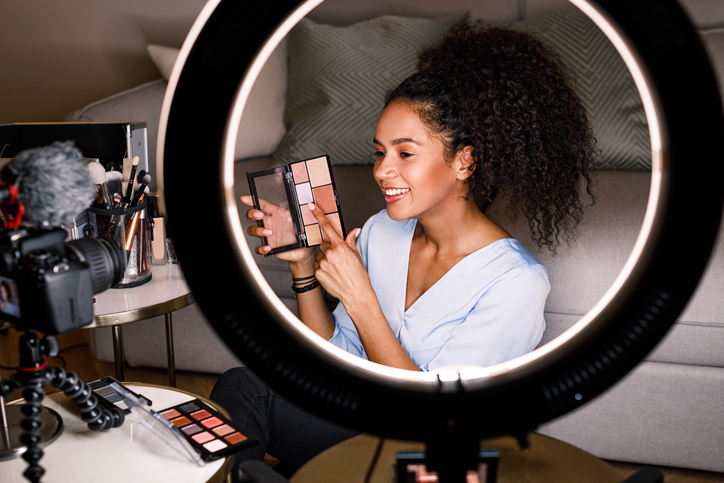‘De-Influencers’ Want You to Think Twice Before Buying That Mascara
TikTok users are speaking critically about viral products and advocating for thoughtful shopping habits. On a platform known for driving consumption, is change even possible?
After years of influencers pushing cosmetics, clothes, personal tech and supplements to the masses, a rising cohort is taking a different tack: telling people what not to buy. They’re calling it “de-influencing.”
The term is being popularised in videos by people whose experience runs the gamut: disappointed consumers, savvy beauty bloggers, doctors dispelling skin-care myths and former retail employees dishing on which products they saw returned most often. Their shared guidance is a rejoinder to a seemingly endless stream of recommendations and promotional content on the platform—and a sign of growing backlash to over consumption. TikTok videos under the hashtag #deinfluencing have surpassed 68 million views.
TikTok has become one of the most powerful forces in online retail, helping to boost butt-lifting leggings, luxe lip oils and green-juice powders, among other trendy products. Brands have poured money into influencer marketing on the platform, knowing a viral video can make almost anything sell out, and videos featuring the hashtag #TikTokMadeMeBuyIt have together earned more than 40 billion views.
“The best way to think about TikTok is that it’s a vehicle that takes a consumer to the checkout line,” said Krishna Subramanian, the co-founder of Captiv8, a marketing platform that connects influencers and brands.
But a deluge of sponsored videos and hyper-enthusiastic reviews has made it harder for consumers to figure out which items are actually worth their money.
“We’re constantly being fed, ‘You need to try this product,’ ‘You will love this product,’” said Karen Wu, 25, a makeup and skin-care influencer who lives outside Los Angeles. De-influencing is an attempt to change that.
What exactly is de-influencing?
The term refers to people speaking critically about products on a platform where endorsements run rampant.
De-influencing videos may steer consumers toward cheaper alternatives, also known as dupes, or discourage them from spending money in certain categories altogether.
Maddie Wells, a beauty influencer in Lexington, Ky., was early to the trend. She began making videos in 2020 about the products she frequently saw customers return to Sephora and Ulta, where she held sales associate jobs between 2018 and 2021.
In a September video with 2.5 million views, she name-drops the Ordinary’s Peeling Solution and Too Faced’s Better Than Sex mascara as cosmetics that—despite being frequently touted by beauty influencers—often found their way back to the shelves at those stores. “I’m calling this ‘de-influencing,’” she says in the video. The Ordinary and Too Faced didn’t respond to requests for comment.
“I can’t say without a shadow of a doubt I was the first person to ever say it,” Ms. Wells said of her coinage, but it has significantly caught on since.
How did the trend start?
Though de-influencing is a relatively new term, TikTok users have been speaking candidly about products for some time now. Last year, entrepreneur and former Real Housewife Bethenny Frankel earned headlines for her unapologetic and critical reviews of popular beauty products.
“I wanted the glow. I wanted to glow like they glowed,” Ms. Frankel said of influencers promoting cosmetics. In trying out popular products herself, she’s found that some of them don’t live up to the hype. She said she’s been approached by beauty companies that want to send her products and have her post paid reviews, but she has turned them down in favour of partnering with brands she already knows and likes.
“The hill that I’m not dying on is lying about a lip gloss,” Ms. Frankel said.
In December 2021, style influencer Elise Harmon went viral after posting a video about the low-cost contents of Chanel’s $825 holiday advent calendar, including stickers, temporary tattoos and a dust bag.
“I was more upset with the fact that I wasn’t being a conscientious buyer. I bought something blindly without really looking at the quality of what was inside,” Ms. Harmon said. “I think people were excited to hear someone say they didn’t think it was worth it.”
A representative for Chanel declined to comment. In an interview with Women’s Wear Daily after Ms. Harmon’s video went viral, Chanel’s president of fashion said the company would be “much more cautious” about introducing similar products.
Why is it taking off now?
The pervasiveness of influencer marketing has put the onus on consumers to decipher which reviews can be trusted and what products are worth their money.
Those concerns came to a head last week when Mikayla Nogueira, a makeup artist with 14.4 million TikTok followers, was accused of wearing fake eyelashes in a sponsored post for L’Oréal mascara. (Neither a representative for Ms. Nogueira nor L’Oréal responded to multiple requests for comment.)
A TikTok spokesperson said that the company “has strict policies to protect users from fake, fraudulent, or misleading content, including ads, and we remove any content that violates our Community Guidelines, Advertising Guidelines, and Terms of Service.”
As viewers become more skeptical of promotions on the platform, influencers who appear raw, honest and critical in their approaches may stand to benefit, experts say.
“Originally, influencers were very beholden to their audience, then brands came along and said ‘let’s see how we can leverage this.’ Then, influencers became super beholden to brands,” said Jenna Drenten, associate professor of marketing at Loyola University Chicago’s Quinlan School of Business. Now, she said, “influencers are swinging back to the accountability between themselves and their audiences.”
What are some other products de-influencers are calling out?
Many of the products being critiqued today are ones that owe their success in large part to TikTok influencers.
Alexandra Williams, a 25-year-old tech sales employee in San Diego, Calif., recently posted about a knockoff of the Stanley tumbler, after seeing the 40-ounce water bottle all over social media. Terence Reilly, Stanley’s global president, said that sales of Stanley’s marquee Quencher bottle increased by 275% in 2022 compared with the previous year.
“Whenever I use my water bottle it’s because I’m going on a hike, or I’m throwing it down below in my car because I’m going to a workout class,” Ms. Williams said. Like Stanley’s Quencher, the bottle has a non-collapsible straw, which she said made it prone to spills and impractical for her active lifestyle. Mr. Reilly suggested that customers looking for a leakproof Stanley alternative could buy the IceFlow Tumbler.
Lola Olson, a 23-year-old fashion and lifestyle influencer in Germany, recently posted a video naming several brands and products she didn’t like, including shampoo from hair-care line Olaplex.
“There’s always going to be those people that are like, ‘It worked great for me.’ It just didn’t for me,” she said. “So I was just being honest, and I feel like that’s what people want from influencers.” She recommended her followers try K18 Hair, an Olaplex competitor her mom advised her to try, instead.
In response to a request for comment, an Olaplex spokesperson shared reports about the brand’s popularity and data on its social-media reach. A representative for K18 said that while the company uses influencers to promote its products, Ms. Olson has not worked with the brand.
Wait, but isn’t that still influencing?
Yes and no.
While emerging influencers may not be paid to name-drop alternatives, it’s easy to see how the space can quickly get murky as those with brand deals may seek to discredit the product of a competitor.
“There’s a big difference between saying, ‘I use a product and I enjoy it and I’m not getting paid to say this,’ versus ‘I have a previous relationship with a brand, and I’m telling you this alternative doesn’t work,’” said Prem Tripathi, a facial plastic surgeon in the San Francisco Bay Area who posts videos countering popular skin-care myths.
In a recent TikTok video, Dr. Tripathi poked fun at the de-influencing trend, offering up alternatives that had no connection to the hyped-up serums and creams in question: a “Golden Girls” mug, a luxury towel warmer and a lint remover.
 Copyright 2020, Dow Jones & Company, Inc. All Rights Reserved Worldwide. LEARN MORE
Copyright 2020, Dow Jones & Company, Inc. All Rights Reserved Worldwide. LEARN MORE
This stylish family home combines a classic palette and finishes with a flexible floorplan
Just 55 minutes from Sydney, make this your creative getaway located in the majestic Hawkesbury region.
As Paris makes its final preparations for the Olympic games, its residents are busy with their own—packing their suitcases, confirming their reservations, and getting out of town.
Worried about the hordes of crowds and overall chaos the Olympics could bring, Parisians are fleeing the city in droves and inundating resort cities around the country. Hotels and holiday rentals in some of France’s most popular vacation destinations—from the French Riviera in the south to the beaches of Normandy in the north—say they are expecting massive crowds this year in advance of the Olympics. The games will run from July 26-Aug. 1.
“It’s already a major holiday season for us, and beyond that, we have the Olympics,” says Stéphane Personeni, general manager of the Lily of the Valley hotel in Saint Tropez. “People began booking early this year.”
Personeni’s hotel typically has no issues filling its rooms each summer—by May of each year, the luxury hotel typically finds itself completely booked out for the months of July and August. But this year, the 53-room hotel began filling up for summer reservations in February.
“We told our regular guests that everything—hotels, apartments, villas—are going to be hard to find this summer,” Personeni says. His neighbours around Saint Tropez say they’re similarly booked up.
As of March, the online marketplace Gens de Confiance (“Trusted People”), saw a 50% increase in reservations from Parisians seeking vacation rentals outside the capital during the Olympics.
Already, August is a popular vacation time for the French. With a minimum of five weeks of vacation mandated by law, many decide to take the entire month off, renting out villas in beachside destinations for longer periods.
But beyond the typical August travel, the Olympics are having a real impact, says Bertille Marchal, a spokesperson for Gens de Confiance.
“We’ve seen nearly three times more reservations for the dates of the Olympics than the following two weeks,” Marchal says. “The increase is definitely linked to the Olympic Games.”

Getty Images
According to the site, the most sought-out vacation destinations are Morbihan and Loire-Atlantique, a seaside region in the northwest; le Var, a coastal area within the southeast of France along the Côte d’Azur; and the island of Corsica in the Mediterranean.
Meanwhile, the Olympics haven’t necessarily been a boon to foreign tourism in the country. Many tourists who might have otherwise come to France are avoiding it this year in favour of other European capitals. In Paris, demand for stays at high-end hotels has collapsed, with bookings down 50% in July compared to last year, according to UMIH Prestige, which represents hotels charging at least €800 ($865) a night for rooms.
Earlier this year, high-end restaurants and concierges said the Olympics might even be an opportunity to score a hard-get-seat at the city’s fine dining.
In the Occitanie region in southwest France, the overall number of reservations this summer hasn’t changed much from last year, says Vincent Gare, president of the regional tourism committee there.
“But looking further at the numbers, we do see an increase in the clientele coming from the Paris region,” Gare told Le Figaro, noting that the increase in reservations has fallen directly on the dates of the Olympic games.
Michel Barré, a retiree living in Paris’s Le Marais neighbourhood, is one of those opting for the beach rather than the opening ceremony. In January, he booked a stay in Normandy for two weeks.
“Even though it’s a major European capital, Paris is still a small city—it’s a massive effort to host all of these events,” Barré says. “The Olympics are going to be a mess.”
More than anything, he just wants some calm after an event-filled summer in Paris, which just before the Olympics experienced the drama of a snap election called by Macron.
“It’s been a hectic summer here,” he says.

AFP via Getty Images
Parisians—Barré included—feel that the city, by over-catering to its tourists, is driving out many residents.
Parts of the Seine—usually one of the most popular summertime hangout spots —have been closed off for weeks as the city installs bleachers and Olympics signage. In certain neighbourhoods, residents will need to scan a QR code with police to access their own apartments. And from the Olympics to Sept. 8, Paris is nearly doubling the price of transit tickets from €2.15 to €4 per ride.
The city’s clear willingness to capitalise on its tourists has motivated some residents to do the same. In March, the number of active Airbnb listings in Paris reached an all-time high as hosts rushed to list their apartments. Listings grew 40% from the same time last year, according to the company.
With their regular clients taking off, Parisian restaurants and merchants are complaining that business is down.
“Are there any Parisians left in Paris?” Alaine Fontaine, president of the restaurant industry association, told the radio station Franceinfo on Sunday. “For the last three weeks, there haven’t been any here.”
Still, for all the talk of those leaving, there are plenty who have decided to stick around.
Jay Swanson, an American expat and YouTuber, can’t imagine leaving during the Olympics—he secured his tickets to see ping pong and volleyball last year. He’s also less concerned about the crowds and road closures than others, having just put together a series of videos explaining how to navigate Paris during the games.
“It’s been 100 years since the Games came to Paris; when else will we get a chance to host the world like this?” Swanson says. “So many Parisians are leaving and tourism is down, so not only will it be quiet but the only people left will be here for a party.”
This stylish family home combines a classic palette and finishes with a flexible floorplan
Just 55 minutes from Sydney, make this your creative getaway located in the majestic Hawkesbury region.






















